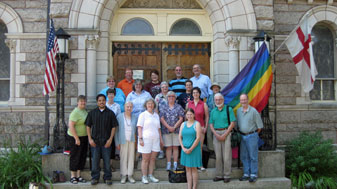…Christ speaks in stories as a way of preparing his followers to stake their lives on a story, because existence is not a puzzle to be solved but a narrative to be inherited, and undergone, and transformed person by person. He uses metaphors because something essential about the nature of reality—its mercurial solidity, its mathematical mystery and sacred plainness—is disclosed within them. He speaks the language of reality—speaks in terms of the physical world—because he is reality’s culmination and code, and because “this people’s mind has become dull; they have stopped their ears and shut their eyes. Otherwise, their eyes might see, their ears hear, and their mind understand, and then they might turn to me, and I would heal them.”
I don’t think the “answer” to the anxiety felt by everyone at that dinner party is Christianity. In fact I’m pretty sure that is not the case, as we represented several different traditions (including no tradition)—and anyway Christ is not an answer to existence but a means of existing, and I am convinced that there is no permutation of man or mind in which he is not, in some form, present. (This from the Catholic nun, Sara Grant, speaking about, and quoting from, the Kena Upanishad: “Brahman is not ‘that which one knows,’ but that by which one knows, as though a crystal bowl were aware of the sun shining through it. ‘When he is known through all cognitions, he is rightly known.’” But it seems to me you could quote Christ himself in support of this idea: “To believe in me, is not to believe in me but in him who sent me; to see me, is to see him who sent me.”)
I do think, though, that both the problem of, and the solution to, our individual anxiety is a metaphysical one. Some modern philosophers (Heidegger, Kierkegaard) have argued that existential anxiety proceeds from being unconscious of, or inadequately conscious of, death. True, I think, but I wonder if the emphasis might be placed differently, shifted from unconscious reaction to unrealized action: that is, our anxiety is less the mind shielding itself from death than the spirit’s need to be. It is as if each of us were always hearing some strange, complicated music in the background of our lives, music which, so long as it remains in the background, is not simply distracting but manifestly unpleasant, because it demands the attention we are giving to other things. It is not hard to hear this music, but it is very difficult indeed to learn to hear it as music.
Who is it that clasps and kneads my naked feet, till they unfold,
till all is well, till all is utterly well? the lotus-lilies of the feet!
I tell you it is no woman, it is no man, for I am alone.
And I fall asleep with the gods, the gods
that are not, or that are
according to the soul’s desire,
like a pool into which we plunge, or do not plunge.
The operative word in these lines from D. H. Lawrence, who wasn’t a conventionally religious person, is soul. It’s a word that has become almost embarrassing for many contemporary people, unless it is completely stripped of its religious meaning. Perhaps that’s just what it needs sometimes: to be stripped of its religious meaning, in the sense that faith itself sometimes needs to be stripped of its social and historical incrustations and returned to its first, churchless incarnation in the human heart. That’s what the 20th century was, a kind of windstorm-scouring of all we thought was knowledge and truth and ours—until it became too strong for us, or we too weak for it, and “the self replaced the soul with the fist of survival” (Fanny Howe). Anxiety comes from the self as ultimate concern, from the fact that the self cannot bear this ultimate concern: it buckles and wavers under the strain, and eventually, inevitably, it breaks….
****
…The meanings that God calls us to in our lives are never abstract. Though the call may ask us to redefine, or refine, what we know as life, it does not demand a renunciation of life in favor of something beyond it. Moreover, the call itself is always comprised of life. That is, it is not some hitherto unknown voice to which we respond; it is life calling to life. People think that diagnosing the apostle Paul with epilepsy or some related disorder nullifies any notion that God might truly have revealed something of himself on that road to Damascus. But God speaks to us by speaking through us, and any meaning we arrive at in this life is comprised of the irreducible details of the life that is around us at any moment. “I think there is no light in the world / but the world,” writes George Oppen. “And I think there is light.”
There is a distinction to be made between the anxiety of daily existence, which we talk about endlessly, and the anxiety of existence, which we rarely mention at all. The former fritters us into dithering, distracted creatures. The latter attests to—and, if attended to, discloses—our souls. And yet it is a distinction without a difference, perhaps, and as crucial to eventually overcome as it is to initially understand, for to be truly alive means to feel one’s ultimate existence within one’s daily existence, to feel one’s trivial, frittering anxieties acquiring a lightness, a rightness, a meaning. So long as anxiety is merely something to be alleviated, it is not life, or we are not alive enough to experience it as such.
…

